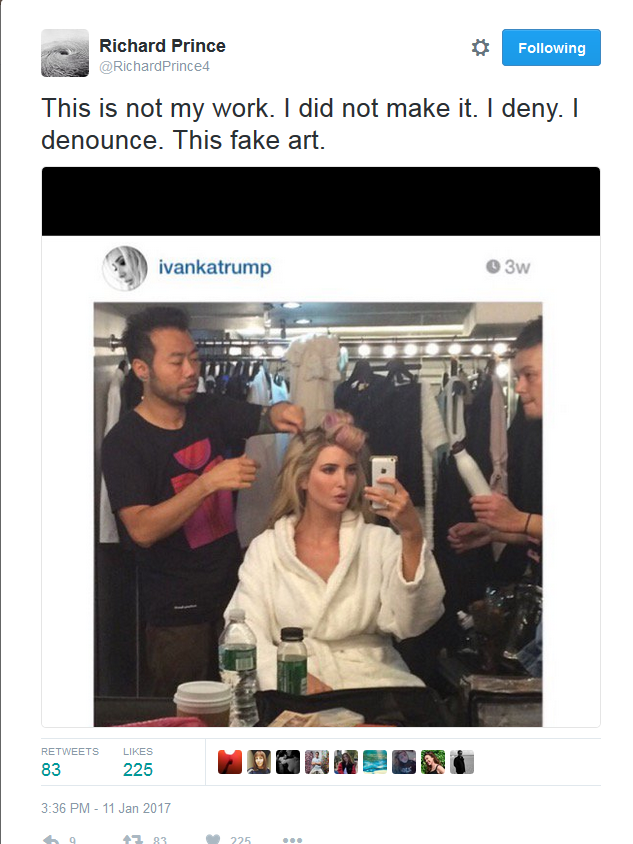There has been much discussion about the impact of the Presidential election on the art market, amidst much generalized anxiety about "fake news." What about "fake art?" Never one to be behind the curve, artist Richard Prince has stepped into the spotlight (to the extent he left). Declaring that one of his controversial “New Portraits” works of Instagram posts of others that was sold to Ivanka Trump is “fake” and that he “denounce[s]” it, Prince raises interesting questions about what the legal ramifications of such a repudiation might be. In this instance he has apparently refunded Ms. Trump’s money, but following on last year’s surprising Peter Doig trial (surprising that it got to trial, not that Mr. Doig won), a hypothetical artist making such a declaration might have some vulnerability under both common law, if not under the Visual Artists Rights Act of 1990, 17 U.S.C. § 106A (VARA).
Fake News, Fake Art? Richard Prince Disavows Work Depicting Ivanka Trump
Topics: Richard Prince, Patrick Cariou, Visual Artists Rights Act of 1990, Art Market Monitor, VARA, Twitter, 17 U.S.C. 106A, Ivanka Trump
Art Advisors are Not Always Fiduciaries—Lawsuit over Cady Noland "Log Cabin" Dismissed
The ongoing saga between Yves Bouvier and Dmitri Rybolovlev over Bouvier’s sale to the Russian billionaire of Leonardo’s Salvator Mundi (and a recent preemptive suit by Sotheby’s against the original sellers of the work to Bouvier) has cast unusual scrutiny over the often-private relationships between art dealers, art advisors, and their clients. Chief among the issues between Bouvier and Rybolovlev is whether Bouvier’s resale to Rybolovlev at an allegedly markedly higher price than Bouvier purchased it for constitutes self-dealing by a trusted agent, or the time-tested adage of buy low, sell high. This is a question of great significant for obvious reasons: in private sales the collector is often relying on the expertise of the art professional. In any fiduciary relationship, however, it is axiomatic that the fiduciary agent (like an attorney or a trustee) cannot enrich himself at the expense of the beneficiary. Whether Bouvier is indeed a fiduciary is a fiercely debated question for another day.
A recent dismissal in New York of a case about Cady Noland’s Log Cabin provides some welcome guidance on the contours of these relationships in the eyes of the law. The finding that the defendant owed no exceptional duty to the plaintiff is a significant pushback against the expansive view of agency that Rybolovlev, among others, has advocated. The decision clarifies that interaction with an expert does not elevate that expert to a position of undivided loyalty. Rather, the terms of the relationship must be on of special trust and confidence. The duties of actual fiduciaries are not changed by this decision, but it will help professionals and collectors understand who is, and who is not, filling that role.
Topics: Cady Noland, Visual Artists Rights Act of 1990, VARA, conversion, breach of fiduciary duty, Yves Bouvier, Log Cabin, Dimitry Ryobolovlev, unjust enrichment, 17 U.S.C. 106A, Brett Shaheen, Janssen Gallery, Michael Janssen, Scott Mueller, Marisa Newman Projects, Wilhelm Schurmann




